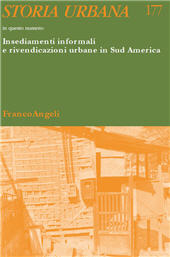Cantegriles montevideanos como asunto político : movilización, vivienda y ciudad (1946-1956)
19-38 p.
The period between 1946 and 1956 saw the Uruguayan government come under the dominance of a progressive political faction, which created the conditions for political debate about housing and the city in a welfare state. Cantegriles and unhealthy housing became the focus of social protest and politics, with communist activists playing a significant role in the mobilization and demand for housing. In response, the local government of Montevideo city initiated an emergency housing program. This article examines the historical evolution of the Cantegriles mobilization for housing, the political discourse surrounding the issue, and the government's policy response. It analyses the agency of the economically disadvantaged within the urban housing context as a novel phenomenon, exploring their relative successes within a milieu that engendered a window of opportunity to demand and be heard.
The outcomes of these social demands and policy initiatives have led to the emergence of urban segregation for economically disadvantaged individuals in the capital city. Despite the provision of emergency housing, the urban planning policies have resulted in their relocation to suburban areas devoid of essential services. Consequently, the agency of economically disadvantaged individuals and their achievements in the housing sector underscore a prevailing tension in the nexus between housing distribution and urban development, within a political environment that favours people's demands and the construction of a welfare state, which was founded on the principle of social integration during the mid-twentieth century. [Publisher's Text].
Fait partie de
Storia urbana : rivista di studi sulle trasformazioni della città e del territorio in età moderna : 177, 1, 2024-
Articles du même numéro (disponibles individuellement)
-
Informations
Code DOI : 10.3280/SU2024-177002
ISSN: 1972-5523
DISCIPLINES
KEYWORDS
- Cantegriles Politica Mobilitazione Benessere Segregazione Stato
- Cantegriles, Politics, Mobilization, Welfare, Segregation, State


